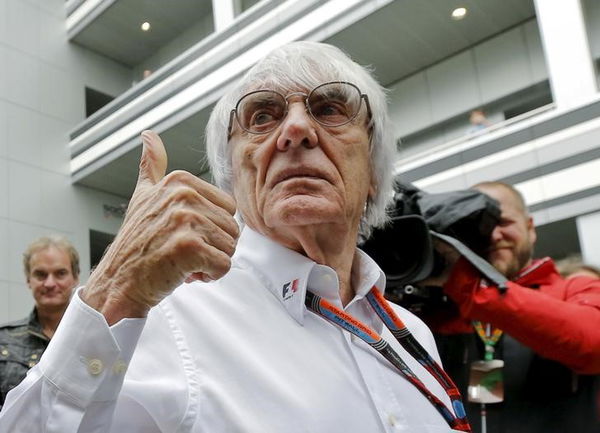
via Reuters
Formula One supremo Bernie Ecclestone speaks to the media at the paddock area ahead of the Russian F1 Grand Prix in Sochi, Russia, October 9, 2015. REUTERS/Maxim Shemetov/Files

via Reuters
Formula One supremo Bernie Ecclestone speaks to the media at the paddock area ahead of the Russian F1 Grand Prix in Sochi, Russia, October 9, 2015. REUTERS/Maxim Shemetov/Files
REUTERS – Formula One’s commercial supremo Bernie Ecclestone has expressed concern for the future of the U.S. Grand Prix in Austin following the reduction of a Texas state subsidy.
“If it’s changed, it’s going to be difficult to continue the race in Austin,” the Briton told the Austin American-Statesman (www.mystatesman.com) from Brazil, where the sport holds its penultimate race of the season this weekend.
The newspaper said the governor’s office had confirmed that state payments to support the 2015 race would drop by more than 20 percent.
ADVERTISEMENT
Article continues below this ad
It said that this year’s payment, based on a different formula for calculating how much economic activity the race generates for Texas, would be closer to $19.5 million than the previous $25 million.
“To use a technical term, I think we’re screwed,” said Circuit of the Americas chairman Bobby Epstein, who has to pay Ecclestone a significant annual sum in race hosting fees.
“The state clearly made promises. I think we made a deal, and we lived up to our end of the deal,” he said of the recalculation.
“It’s like if you go to a restaurant and order a dinner, and then after you’ve eaten the meal they change the price.”
The Austin circuit is Formula One’s first purpose-built track in the United States and has hosted a grand prix since 2012.
This year’s event, which saw Britain’s Lewis Hamilton take a third world championship last month, was badly hit by the weather with Epstein saying the heavy rain had been “financially devastating”.
ADVERTISEMENT
Article continues below this ad
Saturday’s final practice took place behind closed doors and, when fans were admitted, qualifying could not go ahead and was postponed until the Sunday morning.
The race also attributed the reduced crowd in part to the return of neighbouring Mexico to the calendar after a 23-year absence.
The race day crowd in Mexico City was put at 135,000.
ADVERTISEMENT
Article continues below this ad
“The big question now is: “Is the race coming back?,” Epstein told the newspaper.
(Reporting by Alan Baldwin, editing by Ken Ferris)
ADVERTISEMENT
ADVERTISEMENT
ADVERTISEMENT
ADVERTISEMENT

